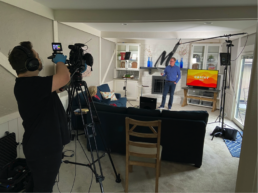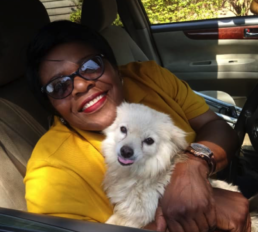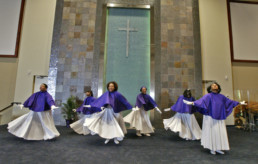Faith in Women
Faith in Women:
COVID-19 forces a faith-informed reproductive justice nonprofit in Mississippi to work towards online organizing in one of the most unequal states for women in the nation.
Kate Cammell | kac2261@columbia.edu
In April 2018, Reverend Anna Flemming-Jones and Ashley Peterson arrived for a workshop on compassionate care at the opulent Hilton Garden Inn in downtown Jackson, Mississippi, the former King Edward Hotel – now a state historical landmark and political center. There, beneath the high ceiling, crown moldings and spiraling marble staircases, Rev. Flemming-Jones and Peterson joined more than two dozen activists and clergy from around the country to discuss and practice ways to tend to the needs of their congregants. The duo are the program coordinator and executive director, respectively, for Faith in Women, a nondenominational religiously-informed reproductive justice nonprofit working across the state of Mississippi. Flemming-Jones and Peterson co-led the workshop on how to be, as their blog put it: “both a compassionate presence and prophetic witness for reproductive health, rights, and justice in their communities.”
In one exercise during the training, participants had to arrange themselves on a reproductive health and justice spectrum. As different issues like abortion or birth control access were discussed, they had to position themselves in the room, moving to spots along a line of strong disagreement to strong agreement. It was one of Rev. Flemming Jones first events with the organization and one of the first times she remembers finding community. She noted, “I remember realizing that I was a lot more liberal than I had understood myself to be. It felt subversive to be in a training that mentioned abortion rights in such a conservative city and state.”

Peterson added, “Being a progressive person in Mississippi is often an isolated and isolating experience. In coming together for training sessions or advocacy events someone might experience strength in numbers for the first time.”
Now, as COVID-19 forces people to stay home or change how they can legally gather, Rev Flemming-Jones and Peterson are reimagining how to achieve their mission of bringing together a community centered on bodily autonomy together in an era when many people have little control over both the movement and wellbeing of their bodies. Faith in Women’s work was already challenging to begin with; the organization fights for reproductive justice in a state where topics like abortion and comprehensive sex education continue to be taboo for many people, and where a history of racism has created some of the greatest health disparities in the nation.
Mississippi is the worst state in the country in health affordability, prevention and treatment, according to the Commonwealth Fund, a nonprofit conducting independent research on national healthcare issues. More than 58,000 Mississippi women, or a quarter of the state’s female population, lack access to insurance or Medicaid coverage, jeopardizing their access to reproductive health services. The state has the third-highest teen pregnancy rate in the nation and a single licensed abortion clinic still operating.
The Institute for Women’s Policy Research (IWPR), which provides both letter grades and a numerical state ranking system of how women fare in each state with categories ranging from poverty to reproductive rights, ranked Mississippi as the worst state in which to be a woman navigating health, wellbeing and poverty. Its highest letter grade in any category is a C-.
However, Mississippi does appear at the top of one list. It’s tied with Alabama as the most religious state in the nation.
Peterson saw this as an opportunity. She was born and raised in Mississippi, where she noted matter-of-factly: “You can’t do anything without acknowledging that faith is going to play a huge role in the conversation.” The organization is a cultural liaison of sorts between church leadership and congregants, and between the religious and secular worlds. They know how to speak the language of each group and act as translators using words that resonate in both faith and secular advocacy spaces like “compassion” and “dignity.”
The organization started with an attempt to provide clergy with comprehensive sexual health resources for their female-identifying congregants. Having grown up in the Methodist church, Peterson knew that “many churches host one-off conversations with youth about the importance of abstinence, or even teach a denominationally-sanctioned curriculum, but very few churches treat sexual and reproductive health as part of the full picture of the spiritual lives of their members.” Instead, Faith in Women connects clergy to comprehensive curricula, like a program from the Unitarian Universalist Association’s Our Whole Lives.
Dr. Nakeitra Burse, a leading public health expert in Mississippi and CEO of Six Dimensions health consulting firm, noted that these health disparities have historical origins, which is why the intersectional and long-term cultural organizing work Faith in Women is doing is so important. “Faith is a big part of Mississippi's culture,” Dr. Burse continued, “We’re in the heart of the Bible belt, so the faith-based community is a very strong community in Mississippi. Those are the leaders that people look up to.”
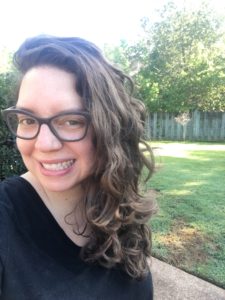
Faith in Women expanded from the educational sphere to organizing women across the state, advising policymakers and partnering with secular organizations, including Planned Parenthood, to provide a religious perspective to women’s healthcare issues. They’ll offer biblical interpretations and justifications for reproductive health and coach organizations on how to better connect with religious women.
The organization serves a core group of about 20 clergy members, nearly all women themselves, along with a wider community of just over 100 women and church leaders. Most of the clergy are located in and around Jackson with some in the Delta and Gulf Coast regions of the state, and mostly represent Protestant congregations, encompassing United Methodist, Cooperative Baptist, Presbyterian USA or Episcopal churches. However, a large part of Faith in Women’s work brings together diverse communities to provide space and opportunities for like-minded people, religious or not, to gather.
For progressive clergy who work in more fundamentalist religious spaces, especially in the Deep South, where even conversations surrounding reproductive topics from birth control to abortion are often socially unacceptable, these advocacy spaces are welcome respites. Rev. Susan Chorley, a Baptist minister who journeyed from Boston for the Space for Grace training session said, “The depth of the conversation among participants and the facilitation allowed us to create connection and community in a very short amount of time. I left the training feeling hopeful and invigorated by the work ahead of us.”
Now, downtown Jackson looks so abandoned that “The Walking Dead” could film in the empty streets, according to Rev. Flemming-Jones. As COVID-19 continues to sweep across the globe and many states are under stay-at-home mandates, organizing events like the compassionate care workshop are indefinitely on hold. Peterson said that nearly 90 percent of Faith in Women’s work took place in-person before the pandemic and the group is finding it difficult to recreate the level intimacy that is so crucial to their efforts on Zoom. The group’s primary work— organizing— is typically rooted in physical communion and drawing together diverse perspectives which they’re finding harder to coordinate online.
Reproductive justice is a framework that is based on an intersectional approach to sexual health equity. The term was coined in 1994 by a group of black women social justice leaders who gathered in Chicago and were later called Women of African Descent for Reproductive Justice. Forward Together, a social justice network, defines reproductive justice as, “all people having the social, political, and economic power and resources to make healthy decisions about their gender, bodies, sexuality, and families for themselves and their communities.”
This framework is crucial in Mississippi where black women face particularly adverse reproductive health outcomes, as do other communities of color and LGBTQ individuals. In just one glaring example, the mortality rate for black women is 40 deaths per 100,000 compared to 12.4 deaths per 100,000 for white women according to the Center for Disease Control and Prevention. Yet, in response to the state’s history of reproductive inequality, there is also a long history of social justice organizing, of which Faith in Women is now a part.
As COVID-19 causes this organizing work to shift, Peterson and Rev. Flemming-Jones are coming to terms with and uncertain future. Peterson lives in the coastal city of Biloxi, Mississippi about three hours south of Jackson, where Rev. Flemming-Jones lives. Pre-pandemic, Rev. Flemming-Jones felt their organizing events were “almost like a friendship movie when people feel all alienated and meet up and are like, aw these are my people.” As she spoke toddler arms reached into her Zoom camera frame. Peterson nodded her head in agreement adding, “that opportunity to just get together and be ourselves, that's what I'm really struggling to reconcile with this COVID situation.” Behind her, a hand-drawn rainbow arced across the whiteboard of her home office.
Now both women are busy juggling their full-time work and childcare from their respective homes. Peterson has a two-year-old son and Rev. Flemming-Jones has two sons, a six-month-old and two-year-old. Many women in their networks are mothers in similar positions. Peterson also said that “a very real and practical roadblock is that not everyone has access to stable internet or reliable computers/phones that can handle video conferencing. Especially in more rural parts of Mississippi, like the Delta, high-speed internet is harder to come by.” Another concern for the group is privacy as they talk about bodily trauma and sensitive topics online. Rev. Flemming-Jones added, “effective organizing in this realm comes from trusting relationships. Those kinds of relationships are so difficult to build online.” Faith in Women’s virtual organizing struggle reflects a broader challenge faced by many advocacy groups across the globe.
Peterson and Rev. Flemming-Jones know that reproductive justice might not be at the forefront of people’s minds because of the pressing concerns of illness and death amid the pandemic. They worry that the coronavirus crisis will only exacerbate reproductive health outcomes in the state. Peterson worries for Mississippi women trapped in abusive homes and young people cut off from “school- and community-based resources like confidential STI screening and testing, contraception, and sexual health information.” She continued, “The very technologies that we’re so dependent on right now, such as telemedicine, have always been heavily restricted in Mississippi when it concerns reproductive health. The danger now is that our state administration is able to pass further restrictions, such as designating abortion an ‘elective’ procedure, while people are distracted by the virus.”
Indeed, in late March Mississippi governor Tate Reeves called on state healthcare officials to stop performing abortions during the pandemic. Texas and Ohio officially banned abortions, calling them non-essential procedures. Though Mississippi’s clinic remains open and is continuing to perform the procedure, reproductive health advocates warn that restricting abortion access during this time creates a path toward abolishing it permanently. Rev. Flemming-Jones said, “The only way this pandemic might somehow be a cause for positive change would be if Mississippi expanded Medicaid. Which seems unlikely.”
Faith in Women is attuned to this changing landscape. Flemming-Jones and Peterson are talking with community members to hear what their current needs are and hoping to partner with a counselor in their network to provide free mental health services. And, while the conference rooms of the King James Hotel where they met in the fall sit empty, they’re figuring out a way to do similar workshop exercises on Zoom.
Pandemic Partnerships
Pandemic Partnerships
A Megachurch so comfortable online that it’s sharing its technological know-how with others
Kate Cammell | kac2261@columbia.edu
As churches remain shuttered in the wake of COVID-19, many have moved services online indefinitely. For some, it’s posed new technological challenges. But for Ada Bible, a 9,000-person megachurch in Grand Rapids, Michigan, the transition to virtual pastoring has been one of the more feasible parts of shifting operations.
Ada Bible has been live streaming their sermons since 2008 and it’s become an integral piece of their weekly worship model. The church has a sophisticated and salaried, eight-person production team, led by Service Programming Director, Jeff Abbott. The team is comprised of a technical director, production director, production coordinators, a live video director and a few weekend volunteers. Abbott said that “the pandemic didn’t change [Ada Bible] radically, our values stayed the same, [to] keep people connected to God and his church.”
Now they’re sharing their technological know-how with churches across the denominational spectrum. The church is donating equipment and their years of digital expertise to smaller congregations. They’ve purchased production kits for a handful of parishes that include a camera, live stream box and mics. Abbott noted, “Barriers that once separated us have helped to draw us together.”
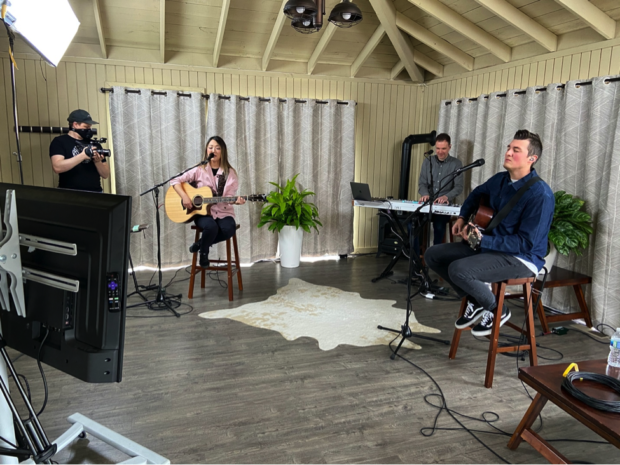
With a trimmed beard and shoulder-length brown hair pulled into a low bun, Kyle Pierpont has an uncanny resemblance to the Western iconography of Jesus. Pierpont is in charge of the church’s pastoral care and often opens the in-person services at Ada Bible’s Cascade Campus, one of the churches four physical locations throughout the 200,000-person city of Grand Rapids.
Before the pandemic, people trickled into the auditorium in cotton tees and with cups of coffee in their hands. There was limited regard for punctuality, and between the flashing lights and pop hymnals accompanied by electric guitar, the services also have the feel of a low-budget rock concert.
The casual vibe Ada Bible cultivated in person and virtually over the years is both strategic and rehearsed. Before the pandemic, producing a weekend service took 8 to 10 people and hours of meetings between the pastors, skill development sessions with the production team and rehearsals where the pastors’ movements were blocked out on stage. Now, Ada Bible is producing the services with just two crew members socially distanced in the homes of the individual pastors.
Pierpont recorded his first virtual message to his congregants while sitting in front of the bright green frond of a banana plant his wife got from Costco. His colleagues teased him about his tropical background after Ada Bible’s first fully virtual service stream aired on March 14, 2020. But Pierpont said the hardest part about going virtual isn’t filming recorded messages, it’s been the realization of how much he relied upon the physical spaces of the church for moments of connection with congregants.
Ada Bible’s multiple-site model is similar to many megachurches across the nation. The Beck Group, an architecture and real estate company, led one of the biggest surveys of megachurches. When the study was conducted in 2015, nearly 62 percent of megachurches had multiple locations and, like Ada Bible, 40 percent identify as nondenominational. Most megachurches draw their large crowds as the result of enigmatic pastors and Ada Bible is no different. Its membership grew rapidly in the 1990s and has coalesced around Jeff Manion, the church’s Senior Pastor. He’s known for a conversational and relational preaching style, using his hands to punctuate his message and often coming near tears as he talks.
As the church’s auditorium first began to fill to capacity, people had to spill through the doors into the church atrium. Pierpont said that instead of creating a bigger auditorium the church opted for the campus model because their concern was that if you build a bigger auditorium you have to keep it occupied. “If it ever doesn't fill up or struggles to stay full you struggle with morale issues, people wandering into a big room that feels empty even if there is a good amount of people,” he explained.
Before Ada Bible created separate campuses, leadership launched venues which were smaller rooms within the same campus building. Manion’s sermon was live streamed onto a screen from where he was preaching just feet away. There were some live elements like a host and live band, and church members could still see Manion in the hallways after the service.
Cheryl Jenkins, a 22-year member of Ada Bible and mom of three, was first attracted to the church because of Manion’s style. Jenkins began attending services in a venue known as The Studio when it opened. She said there was adjustment period at first, but the live elements helped bridge Manion’s virtual appearance.
Jenkins noted that, unlike the auditorium, The Studio has tables and chairs, and said: “It's one of the things that I, personally, like the most. It may seem kind of silly, but it's the truth! I enjoy the casual feel of being able to sit at a small table, while at church, take notes and have my coffee in front of me.” That relaxed feel is strategic.
Manion preaches at the original Cascade campus each week and his services are live streamed to the auxiliary locations and venues once on Saturday nights, and twice on Sunday mornings. Though it may seem unorthodox to drive to a building to watch a pastor preach live at another building, or from even just a few rooms over, approximately 5,000 people did it at Ada Bible every week pre-pandemic.
Aided by strong financial backing, many regards, Ada Bible runs like its own small production company. Now, the church is using some of its saved emergency funding to help others survive. In addition to purchasing production kits, they’re helping churches pay rent or salaries they can’t afford due to the pandemic.
The production team is also meeting with churches over zoom to help them transition. Abbott said, “I offer advice, experience and often just affirmation that their approach will work. I preach connection and care, not production quality. We have had years to develop the technical skills and the organizational skills to do what we do.”
The EDGE Urban Church in Grand Rapids is one of the parishes partnering with Ada Bible. The church reaches an underserved community and 70 percent of their resources come from the outside the church itself. They had a social media presence before the pandemic but were new to creating online sermons. Pastor Evans, The EDGE’s Lead Pastor, noted that his church “uses hip hop as our primary form of worship. It is extremely hard to translate hip hop worship through a screen.” They’re figuring out how to connect in new ways and Pastor Evans said that in this moment their “relationship with Ada has been a lifeline.”
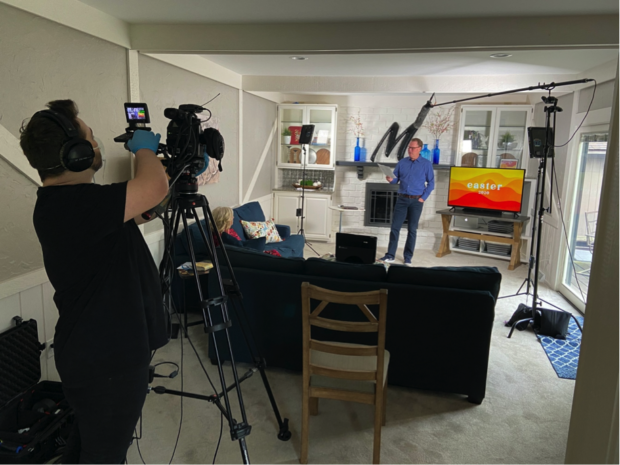
Ada Bible is learning along with the churches they’re guiding. For the first two weeks after the church closed, the clergy recorded sermons in the auditorium, splicing each part together to follow social distancing guidelines. Beginning with their Easter weekend service, the sermons were recorded by people in their own homes. Congregants joined Manion in his pristine white marble kitchen, Teaching Pastor Aaron Buer in his entryway and a three-piece praise band in a living room positioned in a triangle composed of six feet of space between each person. Pierpont said he got positive feedback from the congregation that they liked the familiarity of the being invited into their leaders’ homes. He called it, “meeting people where they are.”
For Summer Wetherbee, a 19-year-old college freshman, that’s in her pajamas. Wetherbee grew up going to in-person services at Ada Bible each week. Now, she’s been watching their weekly services on her laptop. While she hasn’t noticed a change in quality of the sermons, she does “miss seeing the smiling faces of people every Sunday.” Scott Edwards, a 67-year retired theologian and army veteran echoed this sentiment. He watches the sermons on his iPad and, like Summer, is skipping his usual church clothes for the outfit he wears to feed his horses.
On Pierpont’s end, he’s started reaching out more to congregants to create those liminal church hallway spaces online. He emailed congregants for the first time, sending out 2,300 messages. He received nearly 160 personal replies. His email opened by saying, “I wanted to let you know I miss you, and miss connecting with you as your Campus Pastor. I am thinking of you.” The message ended with his email and phone number. It was an attempt to say to people, “hit me up, if you need something or if I can be praying for you, let me know.”
He admits he’s not sure why he wasn’t emailing people before. The church building made it easier for him not to do so, but he noted that it’s a practice he’ll be sure to carry forward post-pandemic. He confessed, “[The church] will not be the same when we get back. If we get back, when we get back—we will not be the same.”
It’s taking a lot of trial and error, but Pierpont confessed, “everyone is kind of scrambling anyway.” Ada Bible is figuring out how to apply their years of virtual intimacy creation in sermons to sustained week-long connection. “Production success is all about vision, planning, preparation, and execution,” Abbott said.
They’re bringing this same rehearsal, adaptation and intention they’ve always relied on to reimagining the church in this moment, while uplifting other congregations. And, of course, they’re throwing in a dash of an ingredient that’s harder to come by in crisis—faith.
Zimbabwean Pastor-In-Training Delivers Groceries During COVID-19
As published in Religion Unplugged
Zimbabwean Pastor-In-Training Delivers Groceries During COVID-19
Zoe Ramushu-Chiriseri | ztc2104@columbia.edu
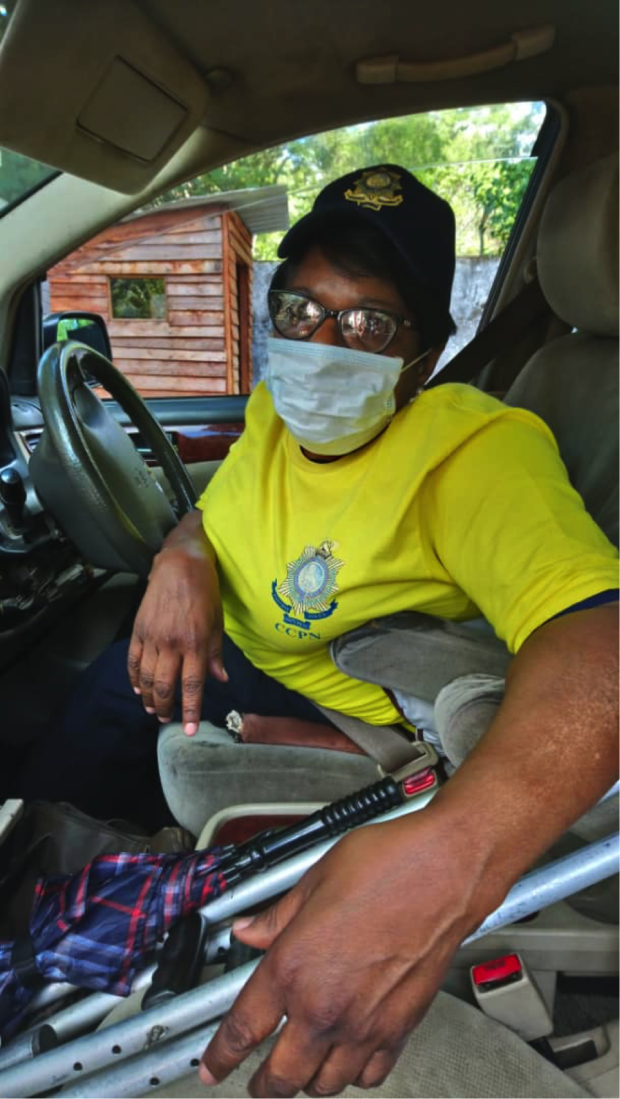
Wearing a surgical mask, Gladys Kwedyo doesn’t get out of her car when she reaches the town of Chitungwiza, 17 miles from her home in Harare, the capital of Zimbabwe. She turns off the eerily empty main road onto a narrow, more worn-out street and pulls right up to a house where an outdoor funeral is going on. No one is social distancing.
She calls out to one of her church congregants and gently reprimands the woman for leaving her house.
“I think a disaster is looming,” she says. Kwedyo instructs the congregant to grab a bag of groceries from the boot of her car. She joins her in a short prayer and then takes off. She has three more church members to visit.
The reason Kwedyo, a 60-year-old church pastor-in-training, remains in the car is not because of the coronavirus. It is because she cannot walk.
Polio robbed her of the use of her legs when she was 2 years old, but she never allowed the disability to stop her from having a fulfilling career and marriage or going into church ministry. Now, as a pandemic has effectively shut down Zimbabwe and the rest of the planet, she won’t allow her disability to stop her from helping those in need. She has a hand-controlled car, two hands and a big heart.
“I do things because they have to be done,” Kwedyo says, speaking about her life in general. She speaks of her passion for helping the less fortunate, which started many years ago when she joined the compassion ministry at her church. “We’d cook three big black pots on a Saturday and go to town and feed the ‘street kids’ — they weren’t as many of them back then,” she recalls. “I’ve never felt disabled. When there’s something that needs to be done, I think, ‘Why not me?’” Kwedyo says she and a few other women from church usually cook for the entire congregation every Sunday, but now, due to the financial crisis and food shortages in Zimbabwe, she mainly looks after the four families to whom she delivers groceries.
“I can’t recall the experience of walking because I was too young,” Kwedyo says, “but I’ve seen photos.” Her Zimbabwean parents were living and working in Zambia, but they headed home for the birth of their second child — they wanted her to carry their nationality and pride. When they returned to Zambia, there was an outbreak of polio, and Kwedyo was one of many children who suffered but survived in 1962. Despite her parents' attempts at various methods of physiotherapy, Kwedyo never walked again.
Kwedyo describes how in many African homes, children with disabilities are often the cause of marital problems, as partners blame each other for the disability and the child is seen as a burden, a curse or an embarrassment. “My parents gave me a new Shona name [after I became disabled]: Rufaro, which means we are happy.”
Kwedyo attended a boarding school for the disabled, Mukuwapasi Clinic, in the small town of Rusape. When asked if she thinks her father’s decision to place her there was good for her, she pauses to think, then hesitantly replies, “Yes. When you’re different, you are the center attraction, and people can laugh at you. We were all different — wheelchairs, crutches, different disabilities. No one laughed.” After five years, she moved to an able-bodied boarding school, as her mother wanted her closer. “My mum would carry my wheelchair, my bag and me to the bus. The bus drivers never let us pay the bus fare — not once,” Kwedyo says.
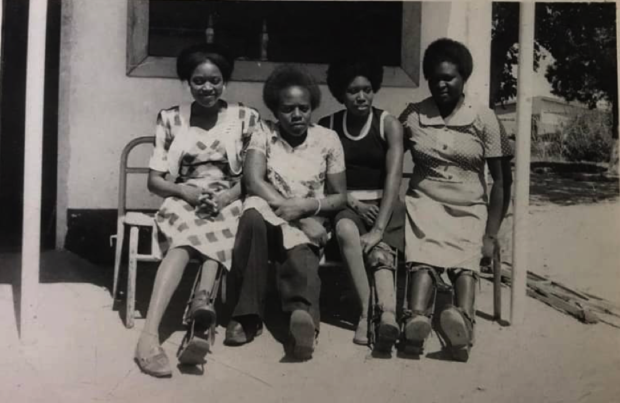
Kwedyo now drives herself in a silvery gold hand-controlled Toyota. “I never thought I’d drive, but my mum told me, ‘Whatever others are doing, you can also do,’” she says. She remembers ordering her first car, a red Mazda 323 with a black interior, straight from Japan. This was when she was working as an administrator for TelOne, a government-owned telecom company formerly known as Post and Telecommunications Corporation — she worked there from 1981 until her retirement five years ago. She is now a pensioner and spends her time rearing chicken, managing a property she built in her backyard and giving back to the community. She leads the Chitungwiza branch of His Presence Ministries International church with her pastors, the Kimbinis, and another female pastor-in-training. But she makes this grocery run on her own.
The next congregant, a blind woman, 65-year-old Chengeto Muguti, is not at home. Kwedyo hears from neighbors that she has gone to weather the storm of the pandemic in a rural area. She leaves the groceries with a young man at the house. Kwedyo points out that the entire time she was in Chi-town, as it is popularly known, she does not remember seeing a single mask, sanitizer or pair of gloves. She also notes that she saw several children and teens gathering to play in the street.
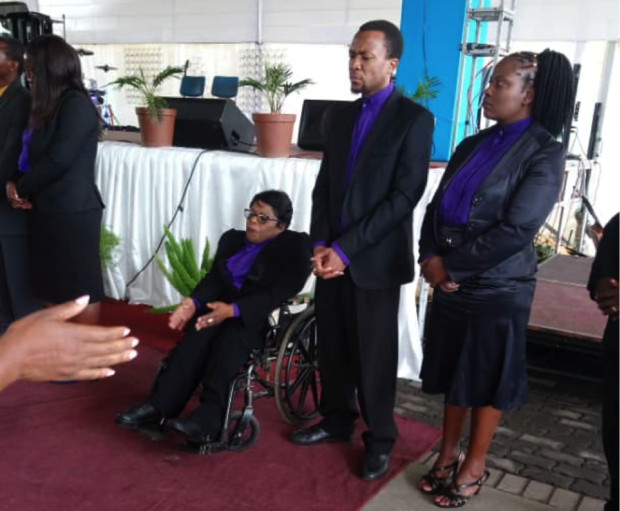
As a child then a teenager, attending an able-bodied school was harder for Kwedyo. She describes it being cold and difficult to navigate, as she was the only disabled pupil at Mount St. Mary’s in Wedza.
“The bathrooms were by the dormitories. I’d make my way on my crutches, and by the time I came back to class the lesson would be over,” she says. “It got a little bit better two years in, when my parents got me a wheelchair.” She recalls making friends because many of the children wanted to push her wheelchair. “The school was on a mountain, and the form one and two [eighth and ninth grade] classes were on the lower level, but I was worried about how I’d get to the classes on the upper levels as I got older.” When she returned for 10th grade to find the headmaster had switched the classroom structures just for her, she says she felt overwhelmed with love and accepted.
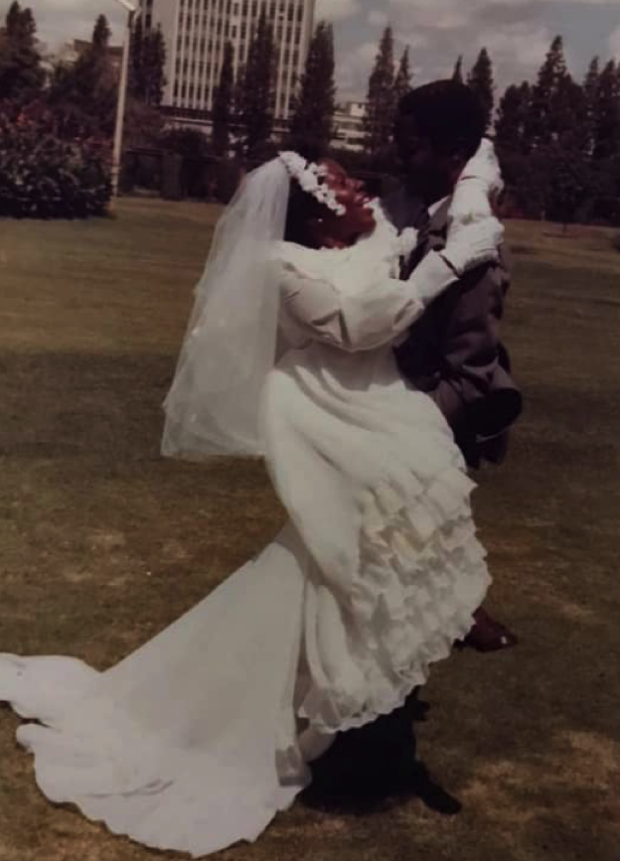
While she was working at TelOne, she met the man who would soon become her husband, Aloise Kwedyo. “I didn’t want to get married,” she says, “so after two years of dating, when I saw he was getting serious, I dumped him.”
When they got back together several months later, Kwedyo says Aloise went straight to speak to her aunt and then her father about marriage. In Zimbabwean tradition, the bride-to-be usually tells her aunt (her father’s sister), who would then pass the message on to her brother. Kwedyo recalls her father also broke tradition by requesting to speak to her husband directly. Usually a groom does not even attend the lobola negotiations, let alone speak to the father of the bride — this is all done through elder male relatives.
“My father told him, ‘You realize my daughter will be served by you and not the other way around — even your mother, she will be doing that?’ Aloise said yes, he’d considered this and was personally prepared, as I would be living with him.” Kwedyo’s father was referring to the tradition in which a new bride in the family is usually given the household chores and made to serve the husband’s family. Many times, this tradition is used to abuse young women.
“My mum was shocked when I told her about me getting married, and I said to her, ‘Why are you shocked? You told me I’m just like everyone else. Other young girls are getting married, and so why shouldn’t I?’” Kwedyo laughs as she remembers this. Thinking back to their conversation about marriage, she reflects, “That’s when I realized how difficult [raising me] must have been for her. She was stressed and anxious for me, but she let me go.” Kwedyo says her mother gave chores to her and her six siblings equally when growing up — laundry, dishes, cleaning the floor. No exception was made for her.
Kwedyo says she and her mother-in-law, who arrived at the end of the wedding celebration when they were packing the gifts, had a strained relationship. A few years into the marriage, her mother-in-law arrived at their office with a new prospective wife for Aloise. Aloise sent his mother a letter, saying, “This is the wife I have chosen, and since you cannot accept her, I am no longer your son.”
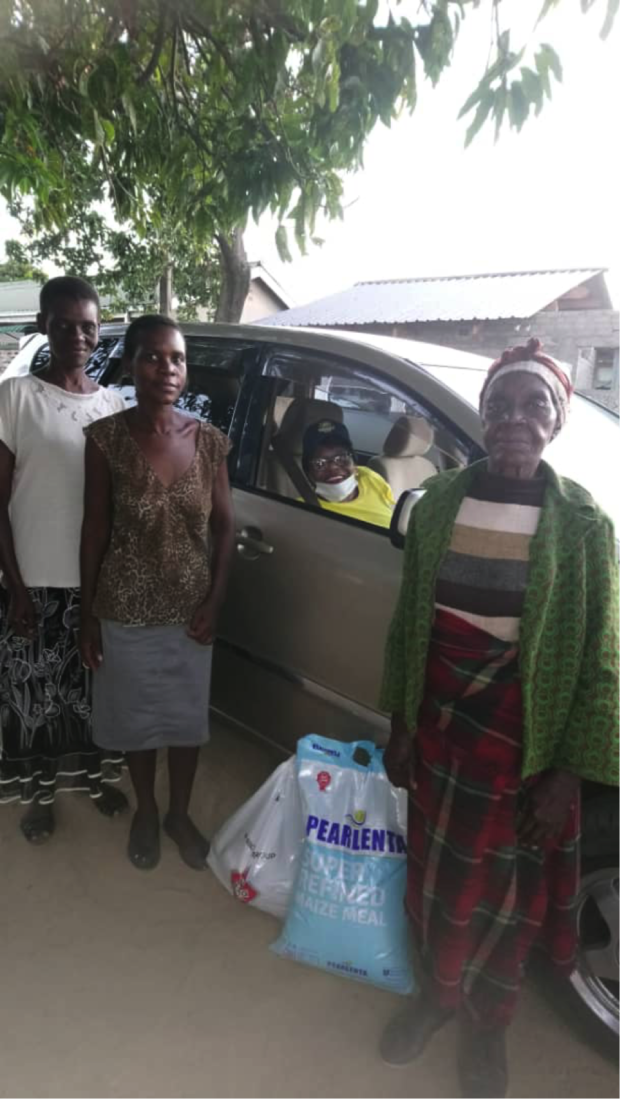
Aloise did not speak to his mother for three years, but Kwedyo says she held on to the teachings of her church — to always repay evil with good, and to love even those who persecute you. She facilitated the mending of her husband’s relationship with his mother, and Kwedyo herself helped nurse her mother-in-law until she died. Her husband had a stroke a few years later. He spent two days in the hospital, then passed away at 39.
As she drops off groceries to her third congregant of the day, Kwedyo says, “Sekuru Gurwe survives by collecting plastic. He gets $1 per kilogram.” When asked how much one Zimbabwean dollar is in U.S. dollars, she explains that the black market rate is constantly shifting, and can even change multiple times in a single day. The currency crisis in Zimbabwe has gotten even worse with the pandemic and subsequent lockdown.
“The government should be looking after the less privileged, senior citizens and those in the disabled categories,” Kwedyo says. She recounts how she’s heard rumors that the government may be giving out cash and that it would be distributed by local councilors.
But when Kwedyo drove by the council office to inquire, no one knew anything about the rumored $180 per family, in Zimbabwean dollars. She left the names of her congregants in case the councilors did start an aid program, but she points out that 4.5 pounds of chicken costs $200 in Zimbabwean dollars, so it wouldn’t make much difference.
As her grocery delivery trip nears its end, Kwedyo says she has been stopped more than once by surprised residents who asked her what she was doing, as none of the other churches had come to help. “There’s no help at all,” she says.
Kwedyo then describes a vivid memory she has. “A crippled man was dragging himself from Market Square to First Street [in Harare]. I was coming to get my passport picture taken when I parked my car and saw him. I failed to get out of the car because I’d break his heart.”
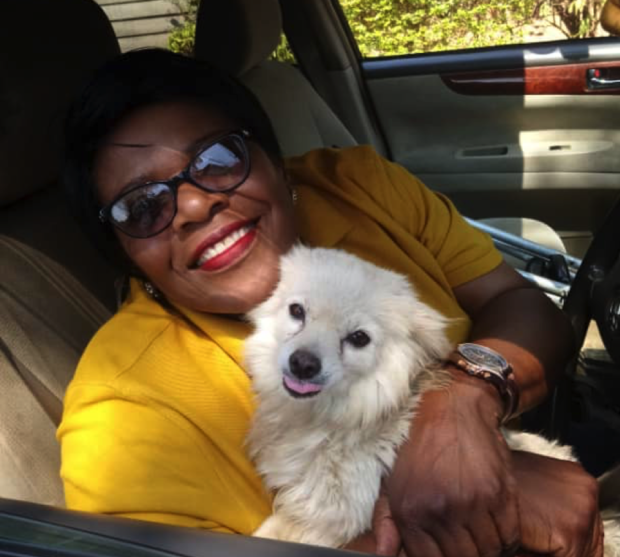
She says she is conscious that many people with the same disability as her have had less fortunate fates. She knows of a girl who was locked in a room for 18 years because her parents were embarrassed of her.
The day she saw the man dragging himself on the street, she called a security guard close by and asked him to ask the man what he wanted. “He wanted a pie, so I gave the security guard the money, watched him buy and give the man the pie, then I drove off. I could get my [passport] picture done another day,” she says.
Her fourth and final stop is at Sheila Mutoma’s home. The 32-year-old, who lives with her elderly mother, was left paralyzed on the left side after a stroke.
“Right now [with the pandemic], somehow everyone is in the same category, able-bodied and disabled,” Kwedyo says, referring to Zimbabwe’s food shortages and price hikes. According to Kwedyo, these problems have escalated since the lockdown. “The shopping centers [in the suburbs] are just as bad as Chi-town when there is a subsidized mielie-meal delivery.”
Mielie-meal is the country's staple food, and Kwedyo says people are willing to brave close-contact queues because they cannot afford the regular mielie-meal. “Things are bad,” she sighs.
Kwedyo says she will brave another trip to deliver groceries again soon. “I have so much to contribute to anyone [able-bodied or disabled]. The Lord has been good to me.” Kwedyo has lived up to her name, Rufaro — she is happy.
Amid Pandemic, the Wichita Kenyan Community Unites Virtually Through Food and Family
As published on Religion News Service
Amid Pandemic, the Wichita Kenyan Community Unites Virtually Through Food and Family
Kelly Davis | kwd2111@columbia.edu

WICHITA, Kan. (RNS) — Mirriam Oyugi planned on having her two sons at home for Easter and was eager to make all of their favorite Kenyan dishes. When their travel plans were hindered due to the pandemic, Oyugi said, her sons opted for cooking lessons instead.
“I taught my boys how to make chapatis on Easter,” Oyugi said. “We did it on video and went through the whole process together. They made theirs and I made mine. I think they had a great time!”
The Kenyan community in this Midwestern state is a close-knit group, with most of its members sharing in common their Christian faith. Protestant church membership in the community is normal, and many Kenyans come together in houses of worship to foster a sense of diaspora community.
During holidays and celebrations, they usually gather together in parks and at people’s homes, eating traditional Kenyan foods such as nyama choma (roasted meat), ugali (maize) and one of the most beloved East African dishes, chapati (unleavened flatbread). This year, of course, is looking a little different due to the coronavirus pandemic, and many Kenyans in Wichita are struggling to find ways to fellowship, a need that is heightened for those who may already feel displaced and far from family. But, like so many others around the globe, they’ve turned to technology to bring them together.
Oyugi said that since Easter, the family has made chapatis via video twice more. She said that although the family can’t be together in person, they are still as connected as ever.
“Something good came out of this,” Oyugi said. “I have some boys who can make very good chapatis.”
Many Kenyans began immigrating to the United States in the 1960s, according to members of the community. At the time, the Kenyan government was advocating for more Kenyans to pursue educational opportunities, leading to scholarships for further studies at U.S. universities. Kenya is among the top five countries with the largest number of African immigrants in the United States, with approximately 136,000 Kenyans widely dispersed across the country, according to Pew Research.
Breakthrough Community Church is a vibrant, Pentecostal congregation in southeast Wichita with approximately 50 members, headed by Kenyan pastor Anthony Macari. The church is known for incorporating both Swahili and English songs with traditional Kenyan beats to create a compelling worship experience for its congregants. Amid the pandemic, the church switched to virtual services on March 22 and there are no current plans to resume in-person services due to restrictions on large gatherings.
In addition to church, people in the community such as Jane Njagi have been taking to Facebook Live to share personal recipes for more complex Kenyan dishes, like mukimo (mashed vegetables) and mandazis (fried bread).
“We are still together, but not together physically, so people are still communicating through social media,” Njagi said. “That is how people have been staying busy.”
At home, Njagi said her three young sons have been helping in the kitchen more than ever.
“It’s bringing a certain togetherness,” Njagi said. “One of my sons is now a professional baker.”
Her family has also taken on a new experiment: learning to cook American food.
“The other day, we made pizza from scratch,” Njagi said. “I’ve been in the United States for almost 20 years and I have never made pizza from scratch. That was very interesting.”
Many Kenyans are also taking to traditional remedies to keep themselves healthy, like mixing hot water, lemon, ginger and honey.
“Herbal remedies have been there since time immemorial,” said Barack Nyakudi. “That was our way of treating people when we didn’t have medications.”
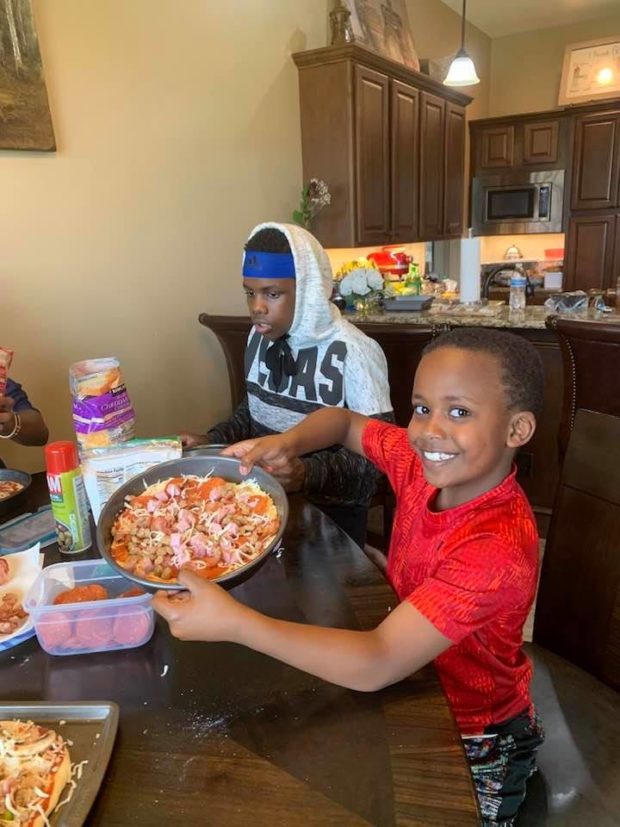
Many in the Kenyan community are using WhatsApp to continue fellowshipping in isolation, according to Marie Macari, first lady of Breakthrough Church.
“We have WhatsApp groups for the entire church and for the women,” Marie Macari said. “We are putting Bible verses there to encourage each other.”
Njagi said that while quarantine has been increasingly difficult in a time when community members need each other more than ever, the app has been used to fill in the gap of physical connection.
“One of the people had a death in the family,” Njagi said. “They communicated through WhatsApp and people got together and contributed.” (It is a custom for Kenyans to offer financial support in times of death, to cover funeral costs and other expenses.)
As the world struggles to deal with the realities of the coronavirus, many Kenyans are praising God for his protection. The number of coronavirus cases in Kenya is surprisingly low, although it is beginning to increase. On Wednesday (May 27), for the first time, Kenya recorded a three-digit increase in new cases over a 24-hour period, taking the national tally to 1,471. There have been 55 COVID-19 deaths in the country of 50 million people.
More than 80% of the Kenyan population identifies as Christian, according to Pew Research — and religion is playing a significant role in the community’s reaction to the pandemic.
“I think that the heart of God is on Kenya,” Oyugi said. “The Bible says that God cannot give you more than you can handle. Imagine if what we are seeing in other countries like America happens in Kenya. Our country cannot handle that.”
Despite the low number of confirmed cases in Kenya, the virus poses other challenges. Susan Williams said the country’s stay-at-home orders are contributing to other forms of suffering.
“People in the villages go to the market each day to get their daily bread,” Williams said. “Now they can’t do that. We thank God that people are not dying but there are also people going to bed hungry.”
Despite the external hardships the virus has brought upon the country, many feel the relatively low number of deaths is also evidence of God’s hand on Kenya. Williams said prayers for protection from the virus have had a significant impact on the lack of spread across the country.
“Melinda Gates said ‘Africans will see dead bodies in the streets,’” Williams said. “We haven’t seen that. People have been praying really hard and fasting about it. There is power in spoken word. Our faith has seen us through, I can say that for sure.”
Some in the Wichita Kenyan community are embracing the stay-at-home orders and using this time to strengthen their relationship with God.
“I have been reading my Bible several times a day,” Oyugi said. “It is very good to have that personal time with God. Having a relationship with God has been very important.”
Teresia Wambugu said now that socializing has come to a halt, families should focus on spending quality time eating and praying together, which is “the way the Lord wants it.”
“Every weekend, we are cooking to take food to socialize,” Wambugu said. “Now, we’re not going anywhere. But for some people that’s good. We had forgotten about God. Families weren’t eating together. Now, they are home like a family.”
Wambugu said she trusts God to see her community, and the world, through these turbulent times.
“God will protect us,” Wambugu said. “He’ll hide and cover us with his blood, even if we have masks or we don’t. The blood of Jesus can cover us from head to toe.”
Stalled Curtain Call
Stalled Curtain Call
Annick Laurent | acl2220@columbia.edu
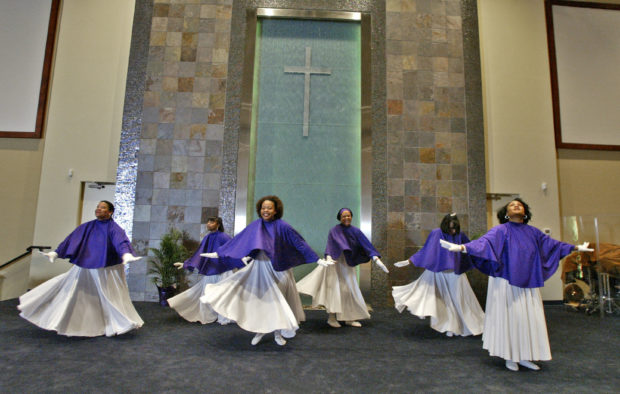
Dressed from head to toe in red, six praise dancers performed a lyrical piece to the gospel song, “Praise is What I Do” by William Murphy. The performance was scheduled for a special women’s service at the Simpson United Methodist Church in Wilmington, Del., in mid-April. Instead, recordings from January and December 2019 screened on the videoconferencing platform Zoom.
The show must and did go on. Sort of. Christian dance ministries throughout the United States have been able to maintain some semblance of normalcy with virtual rehearsals and performances. Individual dancers and groups have found ways to simultaneously keep up with spiritual movement traditions, engage with their religious communities and adhere to social distancing.
The Delaware program was organized by a group called Melodic Movements Performing Arts Program, Inc.
Melodic Movements posted an excerpt to its Instagram account with “The Movement Continues” followed by a glittering pink heart emoji in the caption. The girls’ long crimson skirts fanned out in triangles that disappeared as almost as quickly as they took shape. Their high kicks and arabesques, as well as many twirls, falls and dips were mirrored on the shiny, orange-tinted wooden floor as their instructors and parents watched from the room’s back corners. The onlookers – some dressed in their Sunday’s best from their respective living rooms – offered warm appreciative smiles and words.
One of the group’s last praise dance performances before a live audience was for Scott AME Zion Church in late February. Wilmington natives and public officials -- including Republican Congresswoman Lisa Blunt Rochester, Democrat Representative Sherry Dorsey Walker, City Councilwoman Rysheema Dixon – and Robert Tracy, the Chief of Police, were all in attendance.
Then things changed.
Governor John Carney issued Delaware’s official shelter in place order on March 22, which went into effect at 8:00 a.m. two days later. All non-essential businesses are to remain closed until May 15 or “until the public health threat is eliminated.”
Almost all categories under “Leisure and Hospitality” were prohibited from operating. So, Melodic Movements and other performing arts companies, and independent artists, writers and performers had to shut down. It was the same case for religious organizations which are listed as “Other Services (except Public Administration).”
“God sends us through storms and valleys to strengthen our faith,” read a status posted to Melodic Movements’ Facebook page on March 15. “Despite the National Emergency, schools and business cancellation and spread of the Coronavirus, how many believe God is STILL a way maker, miracle worker, promise keeper and light in the darkness?”
Accompanying the status was a clip of the Beginner Praise Dance class ministering in the company’s studio.
The organization’s plans for the spring and summer such as its Arts Integration Camp, the annual Summer Program auditions, and the upcoming workshops had to be postponed or held remotely.
“Virtual Dance Classes are off to a great start,” a Facebook post from March 17 reads. “Never stop dancing.”
Since the governor’s order, teachers and students have been maintaining community through social media. And classes are still in session. Training in several genres including ballet, hip hop, acrobatics and majorette stylings have all been held online last and this month. The teachers have been providing instruction and encouragement, cheering them on from afar.
“During this time, let us reflect on the beautiful things that God has done for us. 1 Chronicles 16:12 tells us to, ‘Remember his marvelous works that he hath done, his wonders, and the judgements of his mouth.’ God is able to do anything but fail. Let us praise him in advance with expectancy in our hearts. ‘Because praise is what we do, even when we’re going through!’”


